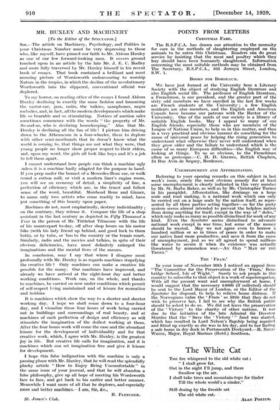POINTS FROM LETTERS
CHRISTMAS FARE.
The R.S.P.C.A. has drawn our attention to the necessity for care in the methods of slaughtering employed on the animals to be eaten this Christmas. Readers can do great service by insisting that the meat and poultry which they buy should have been humanely slaughtered. Information concerning the most suitable methods may be obtained from The Secretary, R.S.P.C.A., 105 Jermyn Street, Londoni S.W. 1.
BOOKS FOR BORDEAUX.
We have just formed at the University here a Literary Society with the object of studying English literature and also English social life. The professor of English literature, a Frenchman, is our president, and the greater part of the sixty odd members we have enrolled in the last few weeks are French students at the University ; a few English residents are also members, and the English and American Consuls have become our patrons with the Rector of the University. One of the needs of our society is a library of suitable English books. May I appeal to many of our English friends, especially those who are members of the League of Nations Union, to help us in this matter, and thus in a very practical and obvious manner do something for the cause of universal peace by helping the rising generation to understand what otherwise they never will understand when they grow older and the failure to understand which is the cause of so many European difficulties—the English way of looking at things. To us so obvious, to the Frenchman often so grotesque.—C. H. D. GRIMES, British Chaplain, 54 Rue Avin de Sequey, Bordeaux.
UNEMPLOYMENT AND AFFORESTATION.
Referring to your opening remarks on this subject in last week's issue, surely the most obvious remedy for at least some unemployment is clearly indicated in this very number by Mr. St. Barbe Baker, as well as by Mr. Christopher Tumor in his pamphlet. Afforestation, like drainage on a large scale and road making, is a national work which can only be carried out on a large scale by the nation itself, as repre- sented by all three parties acting together—so far the party system seems almost intended to prevent the helpless nation from doing anything for itself, except in the way of " doles," which only make as many as possible disinclined for work of any kind. Even the Spectator seems disinclined to advocate national work except in war time, lest some of the money should be wasted. May we not agree even to borrow a hundred million or so in times of peace in order to make our native land more productive, and save it from the curse of unemployment, just as we all agreed to spend millions like water to secure it when its existence was actually threatened by remorseless war.—AN OLD " MAN of THE TREES."
THE FRAM.'
In your issue of November 80th I noticed an appeal from "The Committee for the Preservation of the 'Frain,' Bern- bridge School, Isle of Wight." Surely to ask people in this country to subscribe to that object is a work of supererogation. With all the present want and unemployment at home, I would suggest that the necessary £4000 (if collected) should be sent to the Lord Mayor of London, or the Editor of the Spectator for disposal, to help to relieve home distress. If the Norwegians value the ` Fram ' so little that they do not wish to preserve her, I fail to see why the British public should be asked to do so. We did not leave the preservation of the ' Victory' to the charity of other nations. It was due to the initiative of the late Admiral Sir Doveton Sturdee that the " Save the ' Victory ' " fund was started, which has resulted in Lord Nelson's flagship being repaired and fitted up exactly as she was in his day, and to her finding a safe home in dry dock in Portsmouth Dockyard.—R. NOEL. WHITE, Major, Royal Marines (Retd.) Southsea.












































 Previous page
Previous page